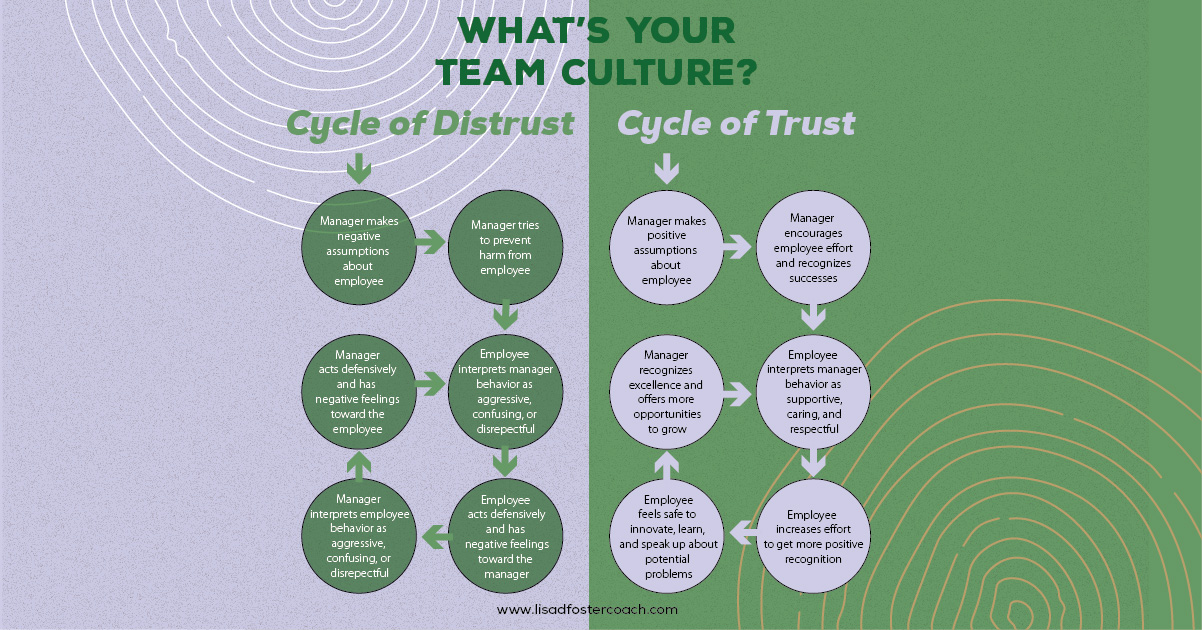A cycle of trust or mistrust operates in every team. Teams led with trust outperform those led by fear.
Key Takeaways
- Trust and performance rise or fall together. Teams thrive when leaders assume positive intent, and spiral downward when leaders default to suspicion.
- The expectations effect is real. When leaders believe in their people, effort and resilience multiply. Doubt creates defensiveness and disengagement.
- Trust is a performance multiplier. Research shows high-trust organizations have higher productivity, adaptability, and loyalty—with less stress and turnover.
- Mistrust is a performance tax. Fear-based cultures spark politics, cover ups, and risk-taking avoidance—slowing progress and eroding results.
- Leaders set the cycle. Your initial stance—trust or mistrust—becomes self-fulfilling. Small signals (promises kept, validation, openness) determine which cycle takes hold.
When leaders assume the best in their team, they initiate a cycle of trust. This creates a culture of safety where employees respond with more trust, teamwork, and effort. On the other hand, when leaders default to distrust or fear, they trigger a cycle of mistrust, resulting in defensiveness, politics, and minimal effort—the very behaviors they want to avoid.
This is sometimes called the expectations effect: people tend to rise—or sink—to the expectations leaders set. That’s why trust at work and performance move together. Trust sets off a virtuous cycle; mistrust sets off the opposite.
Why a Cycle of Trust at Work Matters: The Research
The evidence is clear: trust is the foundation of high performance. When there’s a lack of it, leaders often resort to authoritarian or controlling styles—which research shows actually lowers results.
- Gallup found employees who trust their leaders are 4x more engaged and far less likely to leave.
- Harvard Business Review reports that high-trust organizations have 74% less stress, 50% higher productivity, and 76% more engagement than low-trust ones.
- McKinsey research shows that trust accelerates decision-making and adaptability, especially during periods of uncertainty.
The reverse is also true.
- Gallup: Only 23% of employees strongly trust their leaders—this gap often shows up as office politics, micromanagement, and disengagement.
- Amy Edmondson’s research at Harvard on low-trust environments shows more politics, resistance to change, and “cover ups” that drain performance.
When leaders signal “I believe you can do this,” people take smart risks and persist. When leaders signal doubt, people protect themselves: fewer ideas, slower decisions, more politics. Over time, each pattern becomes a cycle of trust or mistrust that reinforces itself.
In other words: trust is a performance multiplier. Distrust is a performance tax.
A Cycle of Trust Drives Performance
Trust and performance rise or fall together. The dynamic is cyclical, which means once you set the tone as a leader, it tends to reinforce itself.
When leaders assume positive intent and extend trust, employees respond in kind. They feel valued, safe, and motivated to give their best effort. This triggers a virtuous cycle:
- Leaders show care and openness, and as a result, employees feel respected.
- Employees step up with engagement, creativity, and collaboration.
- Leaders see results and extend more trust.
- Over time, performance multiplies and trust deepens.
Cycles of trust don’t just work within companies. The relationship between a company and customers is just as important. For example, in 1982, cyanide-laced Tylenol capsules killed seven people. Instead of hiding, Johnson & Johnson pulled 31 million bottles off shelves —at a cost of over $100 million. This bold act rebuilt public trust, and within a year, Tylenol regained its market share.
When leaders choose trust—even at a cost in the short term—they gain resilience, loyalty, and performance in the long run.
The Cycle of Mistrust
The opposite is just as true. When leaders operate from suspicion—assuming people are lazy, careless, or self-serving—it sparks a downward spiral:
- Leaders micromanage, criticize, or withhold information.
- Employees feel unsafe, undervalued, and defensive.
- Engagement drops; politics and blaming creep in.
- Leaders interpret poor results as proof that people can’t be trusted, doubling down on control.
For example, Boeing engineers raised concerns about the safety of the 737 Max navigation system, warning that pilots would need training to use it safely. Leadership ignored them, prioritizing sales over trust in frontline expertise. Soon after the planes went into use, two planes crashed, tragically killing 346 people. The breakdown of trust cost lives and damaged Boeing’s reputation.
These cautionary tales show that distrust doesn’t just reduce performance—it actively creates risk. Without trust, employees disengage, innovation stalls, and organizational performance suffers.
The bottom line: Both cycles become self-fulfilling. The leader’s initial assumption about people drives the very behavior they were expecting.
6 Signals to Watch
Signs of mistrust are often misinterpreted as “people problems.” Here are 6 signs that signal a lack of trust within a team:
- Silence in meetings.
- Witholding information and cover ups
- Vague updates instead of direct questions.
- “Gotcha” emails.
- Slow decisions despite “alignment.”
- Frequent errors and missed deadlines.
How to Reverse a Mistrust Spiral (Four Actions)
- Validate before solving. Lower defensiveness and raise ownership by helping your team feel seen and heard through validation techniques.
- Coach, Don’t Command: In 1:1s and meetings, use a coaching approach to advice and problem-solving with the GOOD model of conversation (Goals, Options, Obstacles, Do).
- Share the why + keep small promises. Explain decision rationale and follow through on tiny commitments quickly. Visible reliability restarts trust. Protect time for weekly 1:1s where you connect and listen.
- Create safe challenges. Ask for dissent (“What risks aren’t we naming?”). Maintain psychological safety when people ask questions. When people see challenge is welcome, information flow returns.
Stepping into a bigger leadership role?
The Leadership Skills Audit highlights where to adjust so you can lead effectively at the next level.
Want help? Join my FREE Webinar: One-on-Ones that Motivate.
